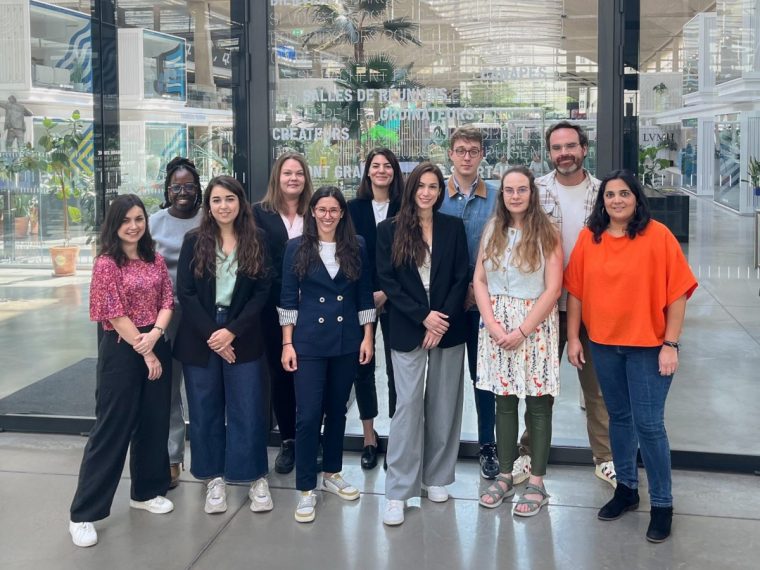One woman who suffered debilitating symptoms for 14 years before she finally received a diagnosis described the news as ‘life changing’
Scientists have discovered a new way to diagnose endometriosis, which could dramatically shorten the time it takes for millions of women to be diagnosed from years to just weeks.
It takes nearly nine years to diagnose the inflammatory disease in the UK, leaving women in severe pain without proper treatment. It affects approximately 1.5 million women in the UK and also causes heavy periods, fatigue, damage to the ovaries or fallopian tubes, and fertility problems.
At the moment, patients are diagnosed following a laparoscopy – or keyhole surgery – during which a biopsy is taken. Some women will also need a physical exam and potentially an MRI or ultrasound scan.
But a new groundbreaking method involves isolating cells directly from menstrual blood for the first time, a non-surgical test which gives a clearer view into how endometriosis behaves and paves the way for tailored treatments.
The team behind the breakthrough said they hoped to have the test ready for patients in three years.
New FeatureIn ShortQuick Stories. Same trusted journalism.
The scientists isolated menstrual blood-derived stem cells (MenSCs) from menstrual blood samples for analysis.
Endometriosis occurs when tissue similar to the lining of the womb grows in other places, such as the ovaries and fallopian tubes. MenSCs drive the formation of this tissue.
Non-invasive test – with 81 per cent accuracy
The current diagnosis test of culturing the cells – removing them from a patient and growing them in a lab – alters their make-up; whereas freshly isolating the cells without culturing preserves their molecular integrity, enabling a deeper and more direct view into how endometriosis behaves.
In their landmark study, available as a pre-print and yet to be published, the international team of female scientists based in Barcelona and Gran Canaria were the first to analyse freshly isolated MenSCs using a process called DNA methylation profiling, which is already widely used to diagnose cancer.
They were clearly able to distinguish which of the 42 women participating had endometriosis from those without – to an accuracy of 81 per cent.
The approach means scientists can use readily available menstrual blood samples to accurately diagnose and categorise endometriosis, a significantly less invasive process for patients than the current diagnostic gold standard of a laparoscopy.
Patient Becca Fowler, 40, who was diagnosed after 14 years of symptoms, described the development as “life changing”. She eventually needed nine separate surgeries on her bowels, kidney, liver and bladder to remove endometrial tissue, causing her body “irreversible damage”.
“It’s really brilliant for all the people that won’t have to go through what I did,” she said.
Paving the way for tailored treatment of the disease
The methylation patterns identified were not only predictive of endometriosis but also revealed how endometriosis was behaving in different patients. The ability to profile patients individually provides important clues about how the disease develops and why it affects people in different ways, paving the way for more personalised treatments, the team said.
The researchers hope the new technology will enable clinicians to detect endometriosis far earlier and without surgical intervention, reducing endometriosis diagnosis times from up to 10 years to just a few weeks.
The research team also hopes their work will lead to new targeted therapies to treat different types of endometriosis. Their approach could enable clinicians to prioritise patients based on how the disease is behaving, and give patients access to targeted treatments before the condition has advanced.
The study was carried out by researchers at Hospital Universitario Insular de Gran Canaria and Hospital Clínic Barcelona – a leading centre in endometriosis care and research – and led by endogene.bio: a Paris-based precision medicine organisation backed by UK investors.
‘We are redefining how we look at endometriosis’
Dr María Teresa Pérez Zaballos, co-founder and chief executive at endogene.bio, told The i Paper her motivation for endometriosis research came following her own diagnosis at the age of 27, “after five years of doctors, surgeries and failed treatments for the wrong conditions”.
She said the impact of the study lies not just in the diagnosis, but also in understanding how the disease behaves in a bid to find new treatments.
“Understanding disease biology is what has gotten every therapeutic area to have better drugs, and we want to do the same for endometriosis,” Dr Pérez Zaballos said.
“Being able to do so non-invasively is key to moving women’s health from a field that relies heavily on symptom-based medicine, to molecular-based medicine in a personalised and accessible way that is difficult to do with biopsies and invasive procedures.”
Dr Pérez Zaballos said the team is already working with the pharma industry and “looking at a three-year timeline to regulatory approval” for patients to start being offered the new test.
Dr Francisco Carmona, a former president of the International Society of Endometriosis and Uterine Disorders, and co-author of the study, said it was “a significant leap forward” in understanding the biology of endometriosis.
“It has far-reaching implications: the methods tested could power the development of non-invasive patient stratification and diagnosis, better treatments and personalised care pathways, transforming the lived experience of patients with endometriosis and how we approach their care,” he said.
 The researchers are carrying out two more clinical trials using a larger group of patients
The researchers are carrying out two more clinical trials using a larger group of patients
Douglas Gibson, principal investigator in the Centre for Inflammation Research at the University of Edinburgh, who was not involved in the study, said that although the authors only looked at a small number of samples – and the research was in its early stages “it has promise as a future diagnostic approach”.
“The approach is relatively novel because rather than focusing on all cells in the menstrual blood, they have separated out a specific subset called menstrual stem cells. Changes in this subset have previously been associated with endometriosis, and in this study, they found differences in their genetic markers, which could be used to identify those with endometriosis,” he said.
“This study would be of interest to patients because it gives insights into how menstruation might be different in endometriosis.”
‘Many women have felt their pain was ignored or minimised for too long’
The researchers are carrying out two more clinical trials using a larger group of patients, which they hope will validate their findings with the goal of developing a non-invasive diagnostic test for endometriosis.
Dr Carmona, who has been working on improving endometriosis care and treatment for 30 years, said: “Endometriosis is a truly devastating disease that causes deep physical and emotional suffering, and for too long, many women have felt their pain was ignored or minimised.”
He described the team’s breakthrough as “an incredibly moving moment” and added: “When you dedicate so many years to understanding a disease that causes so much suffering, seeing real progress feels both humbling and inspiring. I felt a deep sense of hope – not for myself, but for the thousands of women who might finally receive answers and relief.
“Science can be slow, but when you realise that what you are doing could truly change patients’ lives, it reminds you why you started in the first place.”
‘A new test for endometriosis? It’s about bloody time’
 Becca Fowler’s diagnosis took 14 years and she has gone through nine surgeries
Becca Fowler’s diagnosis took 14 years and she has gone through nine surgeries
An endometriosis sufferer whose diagnosis took 14 years and has gone through nine surgeries said the new test is “about bloody time”.
Becca Fowler, a 40-year-old data analyst from East Sussex, said that if the test had been available when she first got symptoms as a teenager, her life would have been “so different”.
After finally getting diagnosed at age 30, she had nine surgeries to remove the endometrial growths that had spread to her bowels, kidney, liver and bladder. She said this caused “irreversible damage”, which means she still has to self-catheterise while on her period – and is likely to have issues for the rest of her life.
She told The i Paper: “I have no doubt that if this kind of diagnostic test was available to me when I was a teenager, I wouldn’t now have needed nine surgeries.
“I need to self-catheterise when I’m on my period because I can’t urinate. I have damage to my body that is irreparable. My life could have been so different.”
Fowler said her 30s were “basically non-existent” as she lost the decade either having invasive surgeries or recovering from them.
She said it makes her “really sad” to think of how different her life would have been if the research had been funded and prioritised earlier, but added: “It’s really brilliant for all the people that won’t have to go through what I did.”
Fowler said the diagnostic test will be “life changing” to patients in terms of getting a swift diagnosis and better treatment, but also validating to those who have been told the pain is in their head.
“It’s about bloody time,” she said. “There’s been so little research done into endometriosis, and it affects 10 per cent of people that have periods worldwide.
“The fact that we’re now getting to the point where there are potential markers in menstrual blood that means that we can be diagnosed without having the invasive procedures, it will just be life changing. It will be game changing.”

